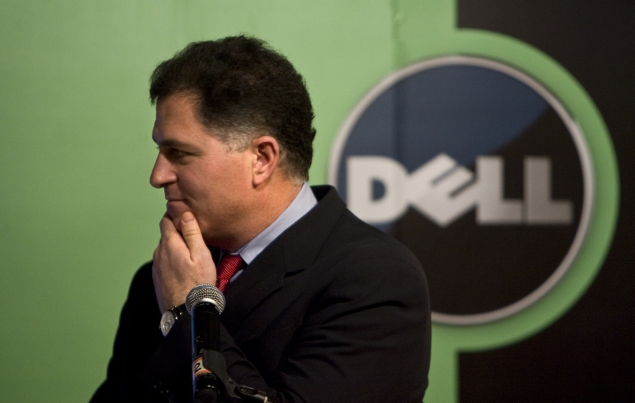- Home
- Laptops
- Laptops News
- Dell founder boosts to buy company
Dell founder boosts to buy company

The 10-cent per share increase came just hours before Dell's shareholders were scheduled to vote on the previous $13.65 per share offer from Michael Dell and investment firm Silver Lake Partners.
But the extra money comes with a catch, a stipulation that the offer's fate be decided by the will of the shareholders who choose to vote in favor of the plan or against it, leaving out those who don't vote at all. Previously, non-voting shareholders were counted as opponents of the proposal.
Dell delayed its shareholder meeting for the second time in two weeks, moving it to Aug. 2 to give the special committee of its board time to consider the offer. The meeting had been set for Wednesday, after being delayed the week before in a sign that the offer didn't have enough shareholder support.
Michael Dell and Silver Lake said Wednesday that the new offer represents their "best and final proposal" and increases the total amount they are willing to pay shareholders by about $150 million, raising the value of the proposed deal to about $24.6 billion.
The group wants to change the conditions for approval to require that a majority of the shares voted, excluding Michael Dell's stake, be in favor of the proposal. Under the current terms, the group needs a majority of all the company's outstanding shares, whether they are voted or not, excluding Michael Dell's stake, to vote in favor of it.
The group originally gave the committee until Wednesday evening to respond to the offer, but later extended it to the morning of Aug. 2, the day of the shareholder vote.
Dell's stock rose 4 cents to close at $12.91, an indication that many shareholders remain doubtful about the deal getting done, even at the sweetened price. The shares' trading volume more than quadrupled its daily average.
In their letter to Dell shareholders, Michael Dell and Silver Lake said they believe the change is "fair and reasonable" to the company's other shareholders, especially given the new offer's additional 10 cents per share for the stakeholders.
Late Wednesday morning, the group said in a statement that according to their last count about 27 percent of the company's shares, excluding Michael Dell's stake, have yet to be voted. For those shares to be treated as if they had voted against the deal is "patently unfair," the group argued. The letter didn't explain why the group accepted the current voting rules when they agreed to the deal in February.
Toward the end of the day, Michael Dell made his most direct pitch to shareholders yet in another letter that emphasized he negotiated the deal in good faith.
"The decision is now yours," Michael Dell wrote to shareholders. "I am at peace either way and I will honor your decision."
Two major Dell Inc. shareholders, billionaire Carl Icahn and investment firm Southeastern Asset Management, have been spearheading an effort to defeat the deal. They depict the proposal as an attempt by Michael Dell to seize control of the company at a sharp discount to its long-term value.
Icahn and Southeastern have offered a more complicated alternative, but they first need to block the deal with Michael Dell and then replace the company's board in a follow-up battle. In his Wednesday letter, Michael Dell said he won't support the alternative proposal, which called "destructive to the company."
The criticism came as no surprise, given the animosity between the bickering parties. Icahn has already said he believes Michael Dell should be ousted from his job, a point he reiterated on his Twitter account Wednesday.
In message to his 21,600 followers, Icahn tweeted that "all would be swell at Dell if Michael and the board bid farewell."
In an open letter to Dell shareholders released later in the day, Icahn and Southeastern accused Michael Dell and Silver Lake of trying to "gut" the proposed deal of one of its few shareholder protections.
"To change the rules at the last minute is outrageous," Icahn and Southeastern said in their letter.
Michael Dell believes he can turn around the company by spending heavily to build better tablets while also diversifying into more profitable areas of technology, such as business software, data storage and consulting. But making those changes are likely to be tumultuous and temporarily lower Dell's earnings, an upheaval that Michael Dell contends will be more tolerable if the company no longer has to answer to other shareholders.
Dell's board says it wants to sell to Michael Dell because it believes waiting for an uncertain turnaround is too risky. If the current deal unravels, analysts believe Dell's stock could plunge below $9, reverting back to its levels of late last year.
(Also see: Dell takeover battle: All you need to know)
Catch the latest from the Consumer Electronics Show on Gadgets 360, at our CES 2026 hub.
Related Stories
- Samsung Galaxy Unpacked 2025
- ChatGPT
- Redmi Note 14 Pro+
- iPhone 16
- Apple Vision Pro
- Oneplus 12
- OnePlus Nord CE 3 Lite 5G
- iPhone 13
- Xiaomi 14 Pro
- Oppo Find N3
- Tecno Spark Go (2023)
- Realme V30
- Best Phones Under 25000
- Samsung Galaxy S24 Series
- Cryptocurrency
- iQoo 12
- Samsung Galaxy S24 Ultra
- Giottus
- Samsung Galaxy Z Flip 5
- Apple 'Scary Fast'
- Housefull 5
- GoPro Hero 12 Black Review
- Invincible Season 2
- JioGlass
- HD Ready TV
- Laptop Under 50000
- Smartwatch Under 10000
- Latest Mobile Phones
- Compare Phones
- Red Magic 11 Air
- Honor Magic 8 RSR Porsche Design
- Honor Magic 8 Pro Air
- Infinix Note Edge
- Lava Blaze Duo 3
- Tecno Spark Go 3
- iQOO Z11 Turbo
- OPPO A6c
- Lenovo Yoga Slim 7x (2025)
- Lenovo Yoga Slim 7a
- Lenovo Idea Tab Plus
- Realme Pad 3
- Moto Watch
- Garmin Quatix 8 Pro
- Haier H5E Series
- Acerpure Nitro Z Series 100-inch QLED TV
- Asus ROG Ally
- Nintendo Switch Lite
- Haier 1.6 Ton 5 Star Inverter Split AC (HSU19G-MZAID5BN-INV)
- Haier 1.6 Ton 5 Star Inverter Split AC (HSU19G-MZAIM5BN-INV)







![[Sponsored] Haier C90 OLED TV | Dolby Vision IQ, 144Hz OLED and Google TV in Action](https://www.gadgets360.com/static/mobile/images/spacer.png)









